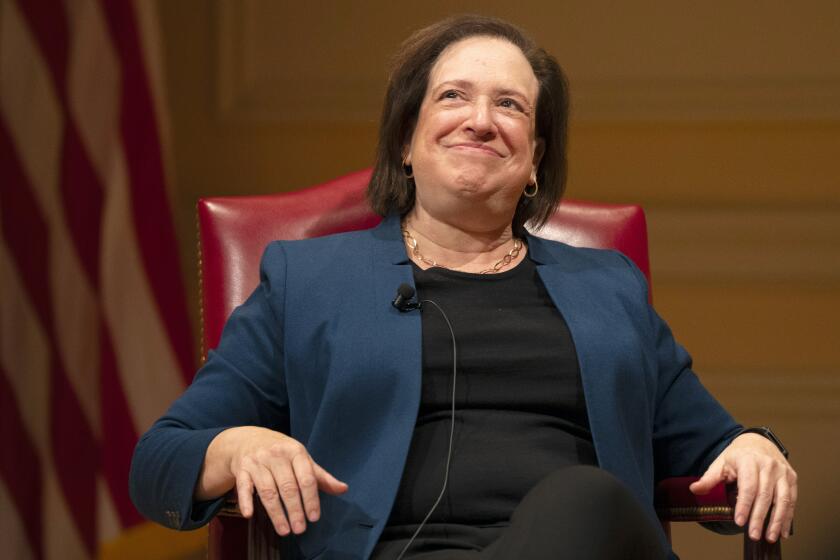Nancy Pelosi fighting for House speakership votes
House Minority Leader Nancy Pelosi is scrambling to shore up the support she needs to become speaker again, just days after she led her party to retake the chamber for the first time since 2010.
A small but increasingly vocal faction of Democratic defectors say fresh leadership is needed to ensure rank-and-file members are heard. They claim they have enough Democrats ready to prevent Pelosi — who has led her caucus for 16 years — from regaining the gavel, but they declined to release all their names.
On Thursday, Pelosi brushed off the threat and said she has the votes needed to win the speakership, which will be determined in a January vote on the House floor. She hinted that sexism may be playing a role in the effort, saying that 14 of the 17 lawmakers who have reportedly signed a letter in opposition to her are men.
“You’d have to ask them. If, in fact, there is any misogyny involved in it, it’s their problem, not mine,” Pelosi said. “I enjoy a tremendous amount of support from the women in our caucus, from the new members who are women in our caucus. And so I get the upside, I think, of being a woman.”
Pelosi’s critics deny that sexism a factor.
“This is not about Nancy Pelosi being a woman,” said Rep. Kathleen Rice (D-N.Y.), one of the lawmakers promising to vote no, pointing to some of the newly elected representatives who have also pledged to vote no. “These are all strong, intelligent women who … won really difficult races. And they should not be disrespected that way. There are other women to support in this caucus who are perfectly capable of being in leadership.”
Depending on how the final uncalled House races are decided, Pelosi can lose no more than 12 to 19 votes.
“The numbers are extremely close,” Rep. Gerry Connolly (D-Va.), who is backing Pelosi. “I’m concerned about the situation... Democrats being Democrats, we like a good fight. We just wouldn’t be Democrats without some drama.”
Pelosi has faced rebellion in the Democratic ranks before and always managed to emerge on top. But this time the struggle could be more difficult.
So far no one has declared their intention to directly challenge Pelosi. But Rep. Marcia Fudge (D-Ohio) said she is considering.
According to a tally of public comments, 12 newly elected members have pledged to vote against Pelosi in the speaker’s race, which will be decided as the first vote in the new Congress in January. Some have made ironclad promises to oppose her under “any circumstances,” and others have made less strident promises. Another dozen incumbents are expected to vote no, according to public statements and sources whipping against Pelosi.
But it is unclear whether that opposition will hold and if it is actually enough to deny her the speakership.
Rep. Seth Moulton (D-Mass.) is one of several lawmakers gathering signatures on the letter of opposition, which he hopes will persuade Pelosi to step aside and allow new Democrats to assume leadership roles.
The Huffington Post this week said 17 names are already on the letter. Both Moulton and Rice suggested that there are more ready to get on the letter.
Moulton said he plans to release the letter before a Nov. 28 closed-door Democratic meeting where the party will select the person it will put forward as speaker on the House floor.
“The whole point of the letter is to accelerate the process so it doesn’t spill out onto the floor,” Moulton said, suggesting he doesn’t want Democrats to be embarrassed by losing a vote live on television. “She’s the one who is trying to drive this to a floor vote. We want to make it clear before it comes to that that she should step aside.”
Pelosi allies have been whipping members to support her and have released letters outlining her fundraising and legislative prowess.
In the last 15 years, she has raised $728 million for Democratic members and in the last election cycle, she raised about half of the Democratic Congressional Campaign Committee’s spending.
Among those circulating letters of support: the head of Emily’s List, a group that helps female candidates who support abortion rights and that backed the vast majority of the new female members; leaders of the healthcare group Protect Our Care; and the heads of several labor groups. Support has also come from fellow members who are expected to lead committees, including Reps. Elijah E. Cummings of Maryland, Richard E. Neal of Massachusetts, Nydia M. Velazquez of New York and Eliot L. Engel of New York.
Supporters argue that Pelosi has more than proved herself an effective leader and is ready to stand up to President Trump or Senate Majority Leader Mitch McConnell.
“We’ve got a battle-tested leader at the top, and I’m hoping that she will absolutely win,” said Rep. Jan Schakowsky (D-Ill.), a close Pelosi ally. “She’s been in the room where it happens. She really understands, as one of the smartest strategists I’ve ever seen — even in the minority she has managed to run circles around the Republicans.
“The question is,” Schakowsky said, “will some minority of the Democratic caucus try to sideline her on the floor, which I think will be very destructive.”
Publicly rebuking Pelosi could have significant consequences if she does ultimately win the speakership. She will help determine committee assignments and which bills get to the floor, among other decisions that could make life easier or more difficult for freshman members.
Pelosi has strategies in her arsenal as she pursues the majority votes she will need on the House floor. There are 435 members of the House; if all races are decided and every member votes, she’ll need 218 in her favor.
She can ask those who oppose her to vote “present” instead of casting a vote for someone else. A “present” vote would essentially count as if that member did not vote at all instead of a vote against her, reducing the total number of votes she’ll need.
Pelosi allies say members who promised they would not vote for her could also live up to that pledge by voting against her in the Democratic secret ballot, but then reluctantly vote for her on the floor or vote “present” when the only other choice would likely be a Republican. But even some Pelosi allies acknowledge that would be politically difficult.
“It’s going to be tough if the first — on the very first day, on TV, out loud, you have to renege on that promise,” said Rep. Don Beyer (D-Va.).
New members say they are already being hounded for votes in the various leadership elections that Democrats will hold after Thanksgiving.
The speaker’s race is “definitely the topic of conversation that everyone is having” at new-member orientation, which began Tuesday, said Rep.-elect Katie Hill, who came out in support of Pelosi on Thursday.
Pelosi’s allies blame Republicans — who have spent years and millions of dollars campaigning against her — for forcing Democratic candidates to pledge to oppose her. Such campaigns have taken a toll on Pelosi’s public approval.
Among Democrats, 23% support Pelosi for speaker, according to a Monmouth University poll released Wednesday. Thirty-six percent prefer someone else, and 41% have no opinion.
Times staff writer Sarah D. Wire in Washington contributed to this report.
jennifer.haberkorn@latimes.com
UPDATES:
2:10 p.m., Nov. 15: This article was updated with Pelosi’s comments.
3:40 p.m.: This article was updated with an estimate of those planning to oppose Pelosi.
3:20 p.m.: This article was updated with Fudge’s comments.
10:20 a.m.: This article was updated with comments from Beyer, Hill and others.
This article was originally published at 6:45 a.m. Nov. 14
More to Read
Get the L.A. Times Politics newsletter
Deeply reported insights into legislation, politics and policy from Sacramento, Washington and beyond. In your inbox three times per week.
You may occasionally receive promotional content from the Los Angeles Times.







